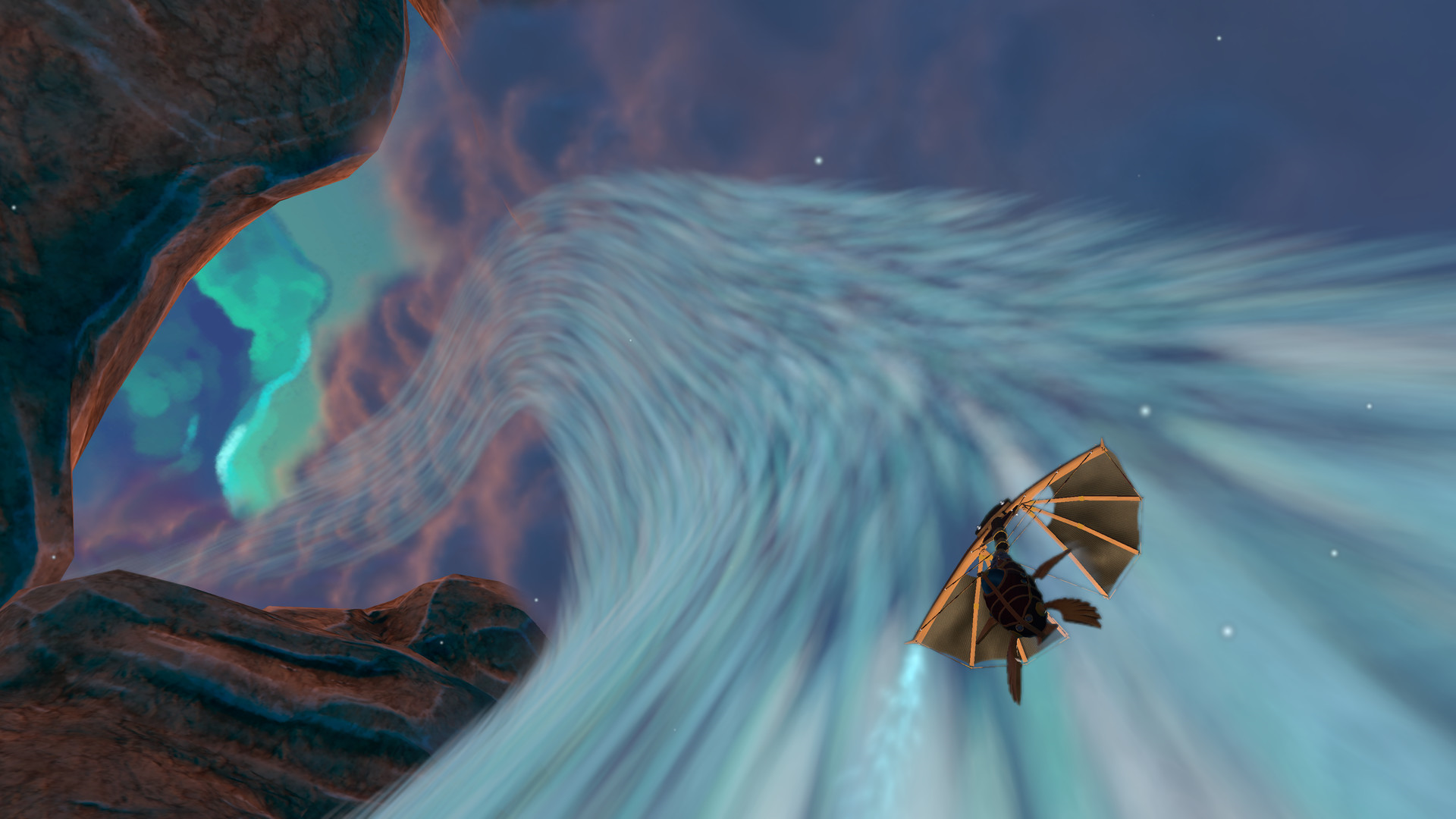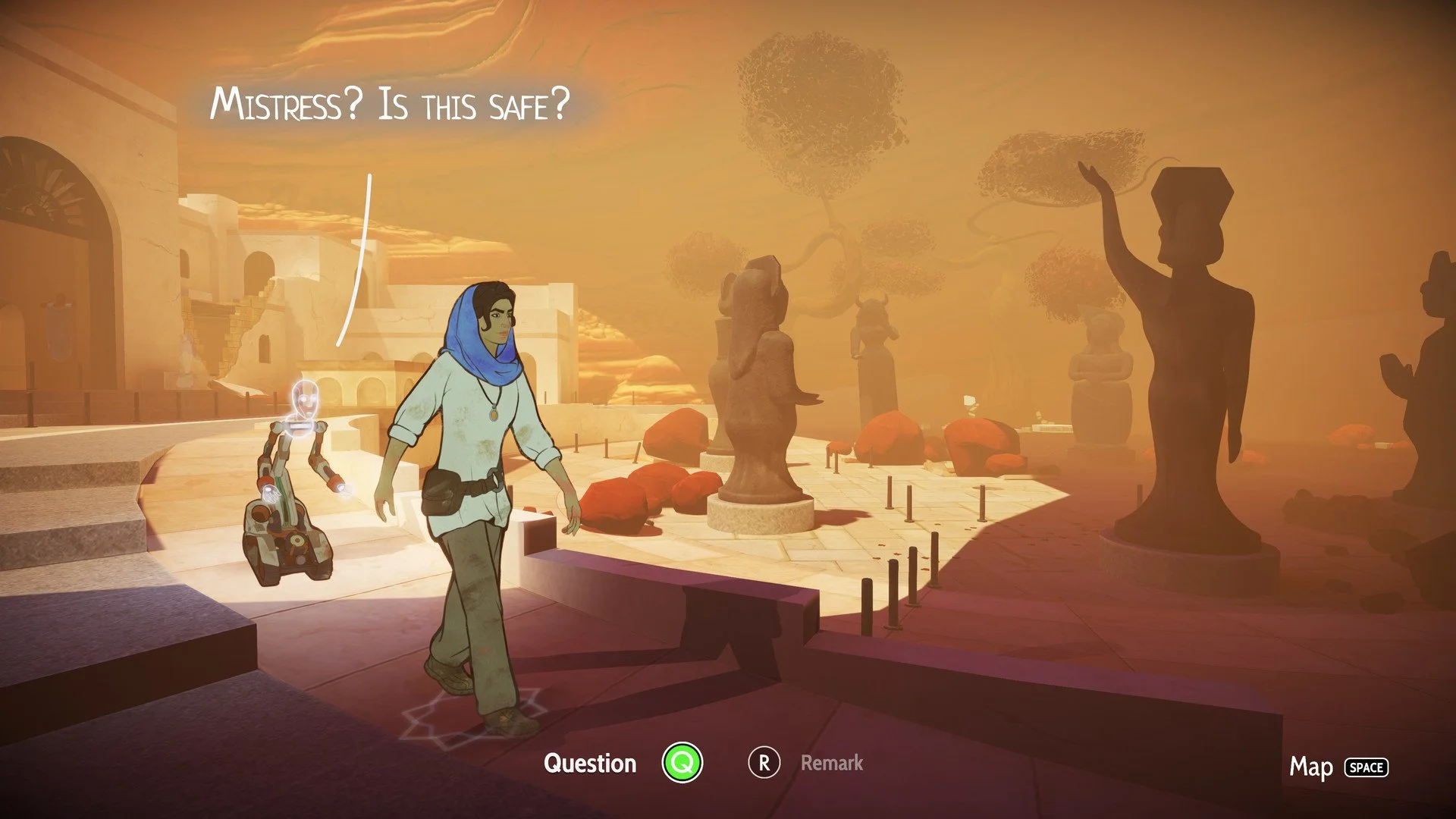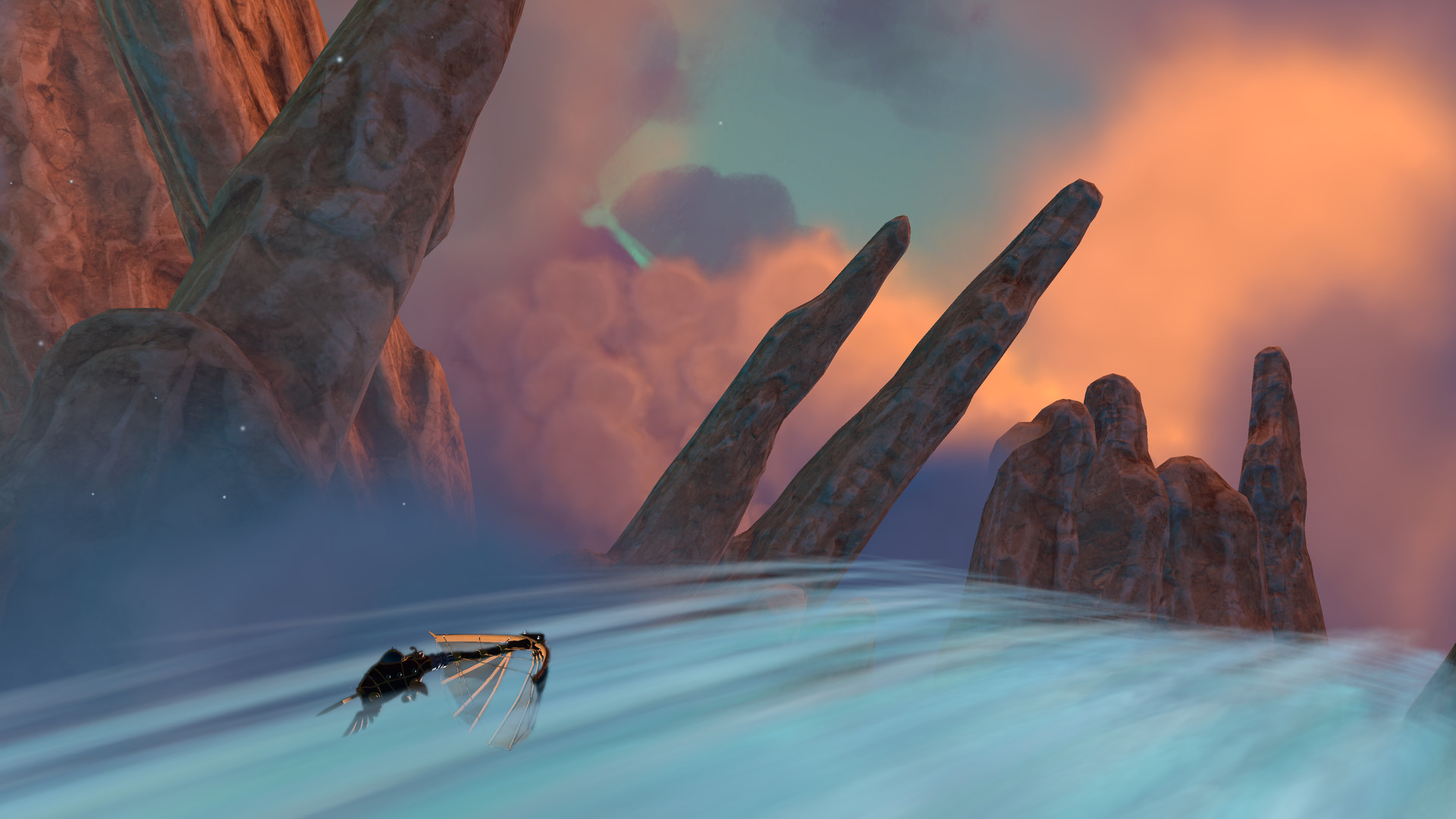Heaven’s Vault
Hey, here’s a pitch: a female Indiana Jones, in space, who must decipher an ancient language in order to solve a missing person’s case. Oh, wait. That story already exists and it’s Heaven’s Vault! From UK developer Inkle, Heaven’s Vault is an absolute masterclass in video game storytelling. With its narrative puzzle solving, semi-open world exploration, and exceptional cast of characters this game will have players itching to uncover its mysteries. Though a few bugs and the occasional system crash were peppered throughout on the Nintendo Switch, those footnotes were easy to forgive and forget as I simply had to know what would happen next.
Heaven’s Vault slow-burns through sandswept hills in its cold open. Accompanied by her robot companion Six, our protagonist Aliya Elarsa ambles her way up a desert mountain in the middle of nowhere. There isn’t much actual gameplay here, but don’t be fooled. Inkle deftly foreshadows all the elements of its game in bite-size fashion. A single dialogue tree prompts players to pick one of three responses. A health bar appears and quickly dwindles as we take our first steps. Then, in the bricked up doorway of a small sandstone building, a single inscription sits waiting to be translated. It’s all there: exploration, puzzle-solving, and bantering with your snarky robot sidekick.
There is a certain level of care, which is immediately noticeable, in your character’s dialogue tree. Most games have three or four speech options to choose from and it’s typically obvious how those choices will affect each scenario. “To be a dick or not to be a dick.” But in Heaven’s Vault, the answers are delightfully ambiguous and decisions are constantly shifting as Aliya’s perspective grows through each conversation. Sometimes all three dialogue options ask the same question, but in subtly different temperaments. Other times the game may offer you three entirely different comments in three unique attitudes. You could be forced to risk a more volatile mood in order to say what you really want to say. You may even find your own perspective suddenly changing as Inkle consistently provides players with a bevy of enticing choices. What’s more is the individuals you meet do not sway so easily.
The Nebula, the game’s overworld, is a harsh place with a polarized political system, deep cultural faiths, and some truly unfortunate colonialist tendencies. History depends on who you talk to and whether anyone will talk to you at all depends on your own history. Trust is a commodity in this place. It can be nurtured and it can be broken. Nearly every character you’ll meet has a clearly defined opinion about you and you may not always be able to dissuade them of their preconceived notions. Heaven’s Vault continues to impress here, as these characters may still cooperate despite how they feel or vice versa. You don’t have to like someone in order to do business and even if you like someone that doesn’t always mean you can trust them. The game is never as simple as waltzing over to an objective and someone handing over the key to your mission. Inkle does offer a straight line, but the branching paths are too tempting.
There are multiple moons in Heaven’s Vault that serve as traversable hub worlds for players to comb through for clues and new characters. However, in order to get to those moons, you have to fly. Exploration has players climbing aboard The Nightingale, Aliya’s personal spacecraft, and sailing the rivers of The Nebula. This flight minigame is a relaxing palette cleanser, one that reminded me of the Gummi Ship levels in Kingdom Hearts. Players will sail effortlessly, only needing to lightly nudge their ship in one direction or another as the game provides clear instructions on which turns to take. This lets you breathe in the interstellar sights with ease. The cosmos is vast and ethereal, punctuated by a noticeably serene shift in the soundtrack. Things do get a tad muddy though when certain sections of the Nebula speed up and turns begin to tighten. Your trusty robot sidekick, Six, also has a penchant for speaking up during these areas, which was perfectly inconvenient. Right as I would need to swerve in order to stay on route, a new dialogue tree would spring up. This often led to missed turns and some light frustration. Thankfully, Inkle allows players to immediately reset the Nightingale and try again. Players can even skip flights entirely later in the game. Also, none of these inflight conversations hold any integral information. So players won’t miss out on anything while their attention is divided.
Where Heaven’s Vault truly demands your attention is in deciphering its signature ancient language mechanics. This is the crux of the game. Players are tasked with steadily decoding mysterious symbols found all throughout the Nebula. A fellow archeologist has gone missing. Solving these inscriptions may be the key to unlocking both what happened to them and to understanding their research on the very origin of the Nebula itself. They start off sparingly. In the game’s opening hour, Heaven’s Vault focuses more on fleshing out its world and characters, leaving only a handful of these symbols scattered between conversations and new headings for the Nightingale. I was dying for more. The more you decipher, the more you discover.
When players are given their first inscription they are shown the entire line of text with only two words and two options. Without any prior translations to work from, players must rely on situational context to make their first educated guesses on the true meaning. It’s an impressive shift. Immediately asking players to rely on their own intuition and research to piece things together. What items are the markings inscribed on and where did they come from? What’s the history behind the item’s location? Who is showing the item to me? Guess correctly, and you’ll be rewarded with an official definition… sometimes.
You can’t always be sure you’ve made a correct translation . Players may go several tries without decoding a single word. Even when you do get things right, some words may have to be used in the proper context multiple times before being added to the lexicon. On my first playthrough, it took me almost an entire hour before I was sure about even two lousy little words. Thankfully, Heaven’s Vault allows players to view all potential translations in the pause menu. It even divides them up between ones that can be solved and ones that cannot (bonus points for this). This helps protect players from endlessly pouring over inscriptions that are out of reach. That said, this quality of life feature didn’t exactly advertise itself.
There are several seemingly helpful offerings whose executions make them a chore to handle. A big feature of this game is its timeline. In the pause menu, players can navigate a massive timeline that spans several thousand years of the Nebula’s history. This can be a great tool to help research when certain artifacts were made and what was happening at the time. Only issue is that it’s quite cumbersome to control. When an item is discovered, the timeline will take you right to that item. However, after exiting that specific spot, the timeline will reset to where you are now in history, which could end up being thousands of years from where you just were. Didn’t memorize the exact date of the artifact you were looking at? Too bad. Even after eight hours with this game, I was still unable to adeptly navigate this massive source of information.
Other basics such as walking (yes, walking) can be buggy and strange. Heaven’s Vault will typically let players walk around its three dimensional levels of their own volition. It will also, however, take control of your character’s motion on its own, sometimes just to go up and down stairs. This is often accompanied by awkward camera angles, button prompts that overlap and cannot be read, certain character models stopping mid-step as the game hiccups and jumps forward several frames. Bugs abound in the Switch edition of Heaven’s Vault (I cannot speak for the Steam version). I was even able to sail the Nightingale off the Nebula entirely, falling straight into the abyss before the game crashed trying to reset my ship’s position. The most egregious of these bugs would be when important dialogue would fail to load right away, and after a hiccup, the text would shoot across the screen so fast it was impossible to read. Despite all this, I was undeterred. Though the bugs became too numerous to ignore, and could slightly compromise important information, they could not stop me from seeking out more answers.
The narrative in Heaven’s Vault will ebb and flow based on your actions and how and when you solve its puzzles. Peeling back the mystery of not just how another archeologist disappeared, but how the entire Nebula came to be, was one of the most thrilling stories I’ve gotten to play in some time. That, and the ending offers one of the all out best end-game decisions ever. Heaven’s Vault offers an immense amount of replayability as well. You can carry over all the translations you make in your first playthrough into a new game plus mode. According to developer Inkle themselves, over one thousand ancient words are included in the game. Knowing more the second time around also changed how I wanted to approach certain characters. Try trusting those you accused and exercise a bit more caution around those that burned you. Though this does not expand the number of moons to discover in the game, I did manage to play through the whole story without touching an entire section of the map. It was well worth revisiting a second time.
Heaven’s Vault is an exceptional game whose story and ancient language are a thrill to uncover. Its branching narrative will leave you wondering what you missed or what you could have done differently. With over a thousand words to uncover, its new game plus will beckon players back to discover new translations, new choices, and maybe even a new ending. Its bevy of bugs and awkward menu navigation are sure to annoy, but won’t detract from its singular symbol solving system, which should have all gamers digging into the many strange truths that lie across the Nebula.
VERDICT: Must Play




